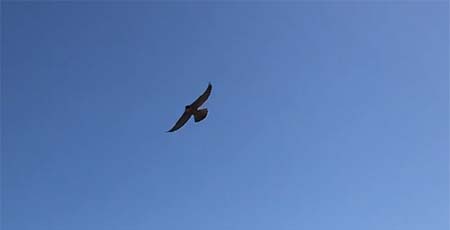As many dedicated UC Davis Medical Center peregrine falcon fans have recently noticed, the two chicks have been in and out of their nest and are learning to fly.

At about six weeks of age, young falcons make their first attempts at flying. After they fledge (take their first flight) they are referred to as fledglings. They are still dependent on the adult falcons until they can hunt for themselves (about four weeks later).
Peregrine falcons are known for their ability to fly at high speeds and are considered the fastest animal on earth. The average bird travels a respectable 19 to 37 mph, but the peregrine falcon generally flies between 40 and 60 mph – and that's just a warm-up. When diving to catch its prey, the peregrine falcon can reach speeds of up to 220 mph.
The peregrine falcon has many features that allow it to fly at such high speeds, including its keel, pointed wings, stiff feathers, and incredibly efficient respiratory and circulatory systems. These allow peregrine falcons to dive at high speeds to capture prey like songbirds, ducks, geese, and even small rodents like mice when hunting.
Stay tuned to the video livestream to keep up with the peregrine fledglings as they continue to learn to fly and hunt.






